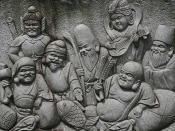Modern Christianity starts with first phase of Enlightenment by Wesley and Methodism. As second phase of pessimistic view, liberalism and some negative perspective showed up with Marxism and some radicals as Death of God movement. In reaction to liberalism came fundamentalism, then Pentecostal and evangelicalism through national association. Bonhoeffer was first to stand up for secular theology and predicted about future of Christianity.
Enlightenment was primarily a European and American phenomenon approaching Christianity based on rationalism, which is emphasis upon human reason and scientific view. John Wesley, born in Anglican and puritan family, had rich blend of Anglican mean and Puritan method even though he was more centered in method(doing Christianity) than reading knowledge and doctrine only. He saw sanctification as Christian perfection and emphasized human's personal experience related to Methodist tradition, positive on scientific trend(i.e. electricity), and overall stand for optimistic first phase in Enlightenment.
Jonathan Edwards, America's first theologian, was driving force of the First Great Awakening(1733-44).
He studied at Yale and was first Calvinistic theologian to introduce Calvinistic theology to Enlightenment. In his book "Surprising Work of God", he wrote a report to show that God is working in the world i.e. by alcohol.
Second Great Awakening started with arise of first Christian camp at Kentucky. Charles Finney who was lawyer at Rochester, later became preacher after conversion, and lead second revival. He was against education and denomination, instead, he was congregation centered, and insisted human can bring God's revival through hard prayer and work(New Measures). Next movement was Holiness revival, which fueled by Phoebe Palmer who thought sanctification and salvation can be done at once, which is quite opposite from Wesley's view.
Second phase of Enlightenment showed quite opposite direction from optimistic Wesley's view. It tended to emphasize negative, dark side of religion trying to...


